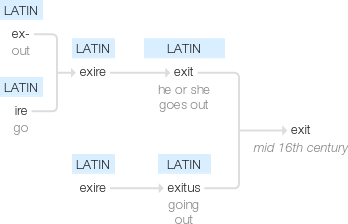Exit
mid 16th century (as a stage direction): from Latin exit ‘he or she goes out’, third person singular present tense of exire, from ex- ‘out’ + ire ‘go’. The noun (late 16th century) is from Latin exitus ‘going out’, from the verb exire, and the other verb uses (early 17th century) derive from it.
wiktionary
The noun is derived from Latin exitus(“departure, going out; way by which one may go out, egress; (figuratively) conclusion, termination; (figuratively) death; income, revenue”), from exeō(“to depart, exit; to avoid, evade; (figuratively) to escape; of time: to expire, run out”) + -tus(suffix forming action nouns from verbs). [1] [2]Exeō is derived from ex-(prefix meaning ‘out, away’) + eō(“to go”) (ultimately from Proto-Indo-European *h₁ey-(“to go”)). The English word is cognate with Italian esito, Portuguese êxito, Spanish éxito. [1] Doublet of ejido.
The verb is derived from the noun. [3] [4]
Borrowed from Latin exit, the third-person singular present active indicative of exeō(“to depart, exit; to avoid, evade; (figuratively) to escape; of time: to expire, run out”); [4] [5] see further at etymology 1 above.
etymonline
exit (n.)
1530s (late 15c. as a Latin word in English), originally a stage direction, from Latin exit "he or she goes out," third person singular present indicative of exire "go out, go forth, depart," from ex- "out" (see ex-) + ire "to go" (from PIE root *ei- "to go"). Also from Latin exitus "a leaving, a going out," noun of action from exire.
Meaning "a departure" (originally from the stage) is from 1580s. Meaning "a way of departure" is from 1690s; specific meaning "door for leaving" is from 1786. The verb is c. 1600, from the noun; it ought to be left to stage directions and the clunky jargon of police reports. Related: Exited; exiting.
Those who neither know Latin nor read plays are apt to forget or not know that this is a singular verb with plural exeunt. [Fowler]
Exit poll attested by 1980.
